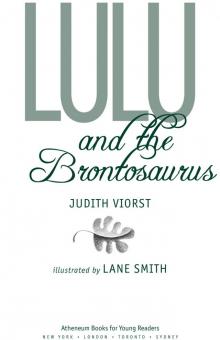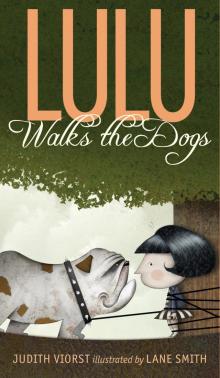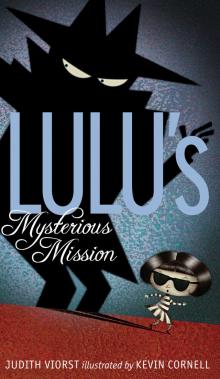- Home
- Judith Viorst
Lulu Walks the Dogs
Lulu Walks the Dogs Read online
Contents
Chapter One
Chapter Two
Chapter Three
Chapter Four
Chapter Five
Chapter Six
Chapter Seven
Time-Out
Chapter Eight
Chapter Nine
Chapter Ten
Time-Out
Chapter Eleven
Chapter Twelve
Chapter Thirteen
Chapter Fourteen
Chapter Fifteen
Chapter Sixteen
Chapter Seventeen
Chapter Eighteen
Chapter Nineteen
Time-Out
Chapter Twenty
Time-Out
Chapter Twenty-One
Chapter Twenty-Two
Chapter Twenty-Three
The Last Time-Out
Overtime
The End
For Daniel Luoh Hersh
—J. V.
For Strino and Creampuff
—L. S.
SINCE a kid named Fleischman is going to hang around a whole lot in these pages, I need to tell you right away that Fleischman is not his LAST name but his FIRST name. Fleischman was his mom’s last name before she married his dad and changed HER name to HIS, just like other moms’ last names could be Anderson or Kelly before THEY got married. (Some moms don’t change their last names after they’re married, but I really don’t feel like discussing that right now.) Anyway—stay with me here—some of these used-to-be Kelly moms might decide to first-name their daughters Kelly, and some Anderson moms might first-name their sons Anderson. Or maybe they’d name their sons Kelly and daughters Anderson. And though not too many Fleischman moms decide to name their kids Fleischman, Fleischman’s mom did.
* * *
Got it? No? Well, too bad if you don’t. I’m busy, and it’s time to tell my story.
Lulu—remember Lulu?—used to always be a big pain, till she met Mr. B, a lovely brontosaurus. Now she is just a sometimes pain, and not nearly as rude as before. But unless what she wants is utterly, totally, absolutely, and no-way-José impossible, she’s still a girl who wants what she wants when she wants it.
So, what is it, exactly, that our Lulu wants? Right now I’m just saying it costs a lot of money. Furthermore, her mom and her dad, who give her almost everything she asks for, said to her—with many sighs and sorries—that they couldn’t afford to buy it for her and that she would HAVE TO EARN THE MONEY TO GET IT.
Lulu thought about throwing one of her famous screeching, heel-kicking, arm-waving tantrums, except that—since her last birthday—she wasn’t doing that baby stuff anymore. So, instead, she tried some other ways—politer, quieter, sneakier, grown-upper ways—of changing their minds.
First try: “Why are you being so cruel to me, to your only child, to your dearest, darlingest Lulu?”
“We’re not being cruel,” her mom explained in an I’m-so-sorry voice. “You’re still our dearest and darlingest. But we don’t have the money to spend on things like that.”
Second try: “I’ll eat only one meal a day and also never go to the dentist, and then you can use all that money you saved to buy it for me.”
“Dentists and food are much more important,” Lulu’s dad explained, “than this thing that you want. Which means”—and here he sighed heavily—“that if you really still want it, you’re going to have to pay for it yourself.”
Really still want it? Of course she really still wanted it! She was ALWAYS and FOREVER going to want it. But paying for it herself—that might be utterly and totally, plus absolutely and no-way-José, impossible. So she kept on trying to change their minds, making her saddest and maddest and baddest faces and giving her mom and her dad some unbeatable arguments. Like, “I’ll move down into the basement, and you’ll get the money by renting out my bedroom.” Or, “You could get money by selling our car and taking the bus instead, which would also be much better for the environment.” But, great as her arguments were, her mom and her dad kept saying no and sighing and sorrying. And after her sixteenth or seventeenth try, Lulu was starting to feel a little discouraged.
Last try: “So, while all the other kids are playing and laughing and having fun, I’ll be the only kid my age earning money?”
“Oh, I don’t know about that,” said Lulu’s mom. “That little Fleischman down the street is always earning money by doing helpful chores for folks in the neighborhood. So young and already such a hard-working boy!”
(Well, what do you know, here’s Fleischman, and it’s only Chapter One. I told you he would be hanging around a lot.)
Lulu did not want to hear about hardworking Fleischman. She did not want to hear anything nice about Fleischman. She did not, in fact, want to hear anything about Fleischman. He was such a goody-goody, such a sweet little, kind little, helpful little boy, that Lulu could almost throw up when she heard him soppily say to the lady down at the corner, “You don’t have to thank me, Mrs. King. It was an honor to hold your shopping bag.” Or, “You paid me too much for raking your leaves, Mr. Rossi. Take back a dollar and keep it for yourself.” Yecch! And when, in addition, the neighbors would say how cute, how adorable-looking Fleischman looked, Lulu would secretly wish that he would trip on his shoelace and knock out his front teeth.
Maybe you think that Lulu shouldn’t be wishing such wicked wishes. Maybe you’re right. But haven’t you ever met someone who all the moms and the dads in the world thought was JUST PERFECT, someone you’d never be as perfect as, someone who, no matter what kind of excellent stuff you did, would always do more of it and do it better? (I knew a someone like that when I was a kid, and I still could almost throw up just thinking about her!)
But let’s get back to the story. Lulu needed to make some money. And she didn’t want Fleischman getting in her way.
So she walked down the street to his house, where he was sitting on his front stoop playing his flute, which he did whenever he wasn’t earning money, or getting the highest marks ever heard of in school, or being completely adorable by smiling his dear little smile and saying to practically everyone he met, “Have a great—I mean a really great—day.” And his shirt matched his pants, and his pants matched his socks, and his hair didn’t have one single hair sticking up. Plus, next to him was a bowl with a snack, and the snack wasn’t Sugar Clusters but sliced carrots. Just looking at Fleischman made Lulu so annoyed!
“Here’s the deal, Fleischman,” she told him, with her hands on her hips and her eyebrows scrunched together. “I won’t rake anyone’s leaves or carry their groceries. I won’t mail a letter that someone forgot to mail. And in winter I won’t help people pour salt on their sidewalks to keep them from slipping on the ice.”
“That’s interesting,” said Fleischman, carefully putting down his flute and smiling his extremely annoying sweet smile. “But what’s your point?”
“My point,” said Lulu, not smiling back, “is that I’LL stay away from YOUR jobs. But I’m warning you, Fleischman, stay away from MINE.”
“Which jobs are those?” asked Fleischman, getting up from the stoop and offering Lulu a carrot.
“As soon as I decide,” she replied, waving away the carrot, “I will tell you.”
Lulu went home and thought and thought, and then she thought some more, trying to figure out what her jobs should be. But since the name of this story I’m telling is Lulu Walks the Dogs, you already know, of course, what she decided.
Well, maybe you already know and maybe you don’t. Because maybe Lulu first decided her jobs—or job—should be baking cookies, or spying, or reading to old people, and then those jobs did not turn out too well. And maybe instead of writing a chapter about how those jobs did not turn out too
well, I’m moving right along to Chapter Four.
Lulu decided that if she got up earlier in the morning she could easily walk a dog before going to school. Somebody in the neighborhood must need a dog walker. Hey, maybe two different somebodies needed a dog walker. Hey, wait a minute, maybe even three. Lulu was certain that she could handle three. And if she charged two dollars and fifty cents a day per dog, and if she walked three dogs five days a week, in one week Lulu could earn . . . (Just give me a moment here—I’ll tell you what she could earn. She could earn . . . Don’t rush me! Okay—it’s thirty-six dollars.)
(Excuse me, it is thirty-seven dollars and fifty cents. I’ve never been all that great at arithmetic.)
Using her mom’s computer and printer, Lulu prepared an announcement that she stuck into all the mailboxes in her neighborhood. Here’s what it said:
LULU THE OUTSTANDING DOG WALKER
WILL WALK YOUR DOG FOR $2.50 A DAY
ON MONDAYS, TUESDAYS, WEDNESDAYS,
THURSDAYS, AND FRIDAYS
Her announcement included her telephone number, so people could give her a call and make an appointment for her and the dog to meet.
By the end of Saturday afternoon, four neighbors had telephoned Lulu. One of these neighbors, however, was—guess who?—Fleischman. “You’ve got a dog to walk?” Lulu asked grumpily.
“I don’t,” Fleischman answered. “My mom’s allergic to dogs. But I know all about them—I’m sort of kind of an expert. And after I read your announcement I thought that if you’d like, I could give you some advice.”
That Fleischman had some nerve, wanting to give her dog-advice when he didn’t even have a dog of his own! Although, to be honest, Lulu didn’t either. “Thanks, but no thanks,” said Lulu, in a not-too-thankful voice. “What can be so hard about walking a dog?”
On Sunday, Lulu met three different dogs at three different houses, all in Lulu’s neighborhood. Her mom went with her to every house, waiting outside on the sidewalk—just as she always did on Halloween—in case the people inside were witches or ogres. None of them were.
The first dog Lulu met was an enormous, bigheaded, bad-breathed brute named Brutus, who circled around her snarling and sniffing and sniffing and snarling and sniffing while Lulu waved her hand in a cautious hello.
“He’s deciding whether he likes you,” said Brutus’s owner, who looked amazingly like Brutus. “We’ll know that he does if he starts thumping his tail.”
Lulu quit waving her hand and started saying, “Nice Brutus. Nice Brutus,” though she didn’t think that Brutus was nice at all. And after he had finally stopped with the circling and sniffing and snarling, and sat himself down in front of her, and glared at her out of his beady bright-red eyes, Lulu quit saying “Nice Brutus” and glared right back. And a little while later, having decided they’d never be New Best Friends, Lulu announced, “Well, I’ll be leaving now.”
But as Lulu started to leave, Brutus jumped up, ran over, and knocked her flat down on the rug, then proceeded to lick her face and thump his tail. Brutus’s owner pumped one fist in the air and announced approvingly, “He likes you. Brutus likes you. He really likes you. And believe me, this is a dog that doesn’t like everyone.”
“And believe me,” said Lulu, standing up and wiping globs of dog-slobber off her face, “I am a girl who also doesn’t like everyone.”
She was about to add that Brutus was among the everyones she didn’t like when his owner said, “You’re hired. You’re hired. You’re definitely hired. And furthermore, because Brutus is on the large side, I’m going to pay you fifty cents extra a day.”
(On the LARGE side? Brutus was GIGANTIC—a mountain, a whale, an SUV of a dog!)
Still, two dollars and fifty cents and then another fifty cents made three whole dollars every single day, which meant that every five days Lulu would earn, well—after she figured out what she would earn, she decided that this was an offer she couldn’t refuse. And so she nodded and said okay when Brutus’s owner said to her, “See you Monday morning—six thirty sharp.”
As Lulu walked down the street to her second appointment she started singing this money song, which all of a sudden had popped into her head:
By the time she had sung her song a few times she had come to the next house, where the doorbell was answered by someone who introduced herself to Lulu as Pookie’s mommy. (She wasn’t a dog, of course. She was a plump, pink human being with many curls. Did you really think that a dog had answered the doorbell, opened the door, and introduced herself?)
A teeny-tiny white fuzzball was nestled cozily against Pookie’s mommy’s chest and held in place by Pookie’s mommy’s left hand as Pookie’s mommy explained (Hang in there, please—this sentence is long!) that though her little girl’s name was spelled P-O-O-K-I-E, the POOK part rhymed with DUKE and not with BOOK, and that Pookie got very upset if she was called by a name that rhymed with the wrong word. “You’ll never have a problem if you just remember DUKE,” said Pookie’s mommy—or PUKE, Lulu secretly thought but did not say. “Otherwise, you’re sure to hurt her feelings, and trust me, you wouldn’t want to hurt Pookie’s feelings.”
Lulu soon learned that the other thing that was sure to hurt Pookie’s feelings was expecting Pookie to walk when Lulu walked her. “Here’s how this works,” Pookie’s mommy explained. “You’re the one who walks. Pookie gets carried. And when it’s time, you’ll sit her, gently, underneath a tree, and she will do what she’s supposed to do.”
“How will I know when it’s time?” Lulu asked. And Pookie’s mommy answered, “Not to worry. She will let you know.”
During this whole conversation Pookie never opened her eyes, not even when she was handed over to Lulu, who was urged by Pookie’s mommy to practice saying Pookie’s name several times.
“Nicely done,” said Pookie’s mommy to Lulu, after she’d finished practicing her OOKs. “I am offering you the job of Pookie’s dog walker.”
Lulu didn’t think much of a dog that couldn’t even be bothered to open her eyes. But she very much liked the twelve dollars and fifty cents that she would be paid every week to walk her. Remembering, as she did now and then, the manners she had learned from Mr. B, Lulu said to Pookie’s mommy, “Thank you. I accept. I’ll see you at six thirty-two on Monday morning.”
The third house Lulu stopped at was a haunted-looking house, its yard overgrown with half-dead bushes and weeds, and all kinds of wrecked and rusted and ratty old furniture, pots, bikes, toys, and other junk piled helter-skelter on its sagging front porch. The skinny man and woman who answered the door in matching warm-up suits and baseball caps greeted Lulu warmly and then started poking around in the mess on the porch, with Mister explaining, “Our dog is in there somewhere,” and Missus explaining, “Cordelia loves to hide.”
Since Mister and Missus seemed to be having trouble finding Cordelia, Lulu joined in the hunt for the hidden dog, whose tail or ear or eye or leg would make a brief appearance, then once again vanish. Finally, Lulu, desperately trying to grab some part of Cordelia, instead knocked a broken-down bike off the top of the pile, which was followed by an avalanche of water-soaked books, chipped dishes, several window screens with holes, and . . . one yapping dog.
Lulu covered her head with her hand to keep it from being bopped by a falling screen. With the other hand she reached out for Cordelia.
“Gotcha!” said Lulu.
“Good job!” said Mister and Missus, who patted her shoulder and told her she was hired.
And Lulu, handing them back their dog, said to Mister and Missus, “I’ll see you Monday morning at six thirty-four.”
I can tell you already have questions for me, and I think I know what they are. So, why don’t we take a time-out and get them over with?
Shouldn’t Lulu’s mom and her dad stop her from trying to walk three dogs at once?
They should, but they won’t. Lulu is hard to stop.
What happened to Fleischman—didn’t you say he’d be hanging arou
nd a lot?
I did, and he will be. Don’t be in such a rush.
How come Mister and Missus have all that junk piled up on their porch?
Beats me. I’ve been wondering the exact same thing.
What is it Lulu wants to buy with all this money she’s earning?
I really don’t feel like discussing that right now.
On Sunday night, before bedtime, Lulu carefully set the alarm clock for 6:25. She picked out the clothes she wanted to wear—so she wouldn’t have to think about them in the morning. She tracked down her disappeared sneakers and carefully placed them next to her bed—so she wouldn’t have to go looking for them in the morning. She even, to save a few seconds, squeezed some toothpaste onto her toothbrush—so she wouldn’t have to squeeze toothpaste in the morning.
She figured that she could be dressed, washed, and tooth-brushed in three minutes and fifteen seconds on Monday morning, which would leave her forty-five seconds to eat some cold cereal, and one whole minute to run to Brutus’s house.
Lulu was feeling extremely pleased with her plan. So, after saying good night to her mom and her dad and her pet goldfish and the photo of Mr. B that hung on her wall, she sang herself to sleep with a money song:
Lulu expected to have some merry money dreams that night, but instead she dreamed all night about—guess who?—Fleischman. He was standing outside her front door and shaking his head and saying over and over again, “THREE dogs you’re walking? Mistake. A big mistake.”
Lulu woke up at 6:25, and for the first five minutes her plan worked perfectly. Dressed and washed and tooth-brushed in exactly, EXACTLY, three minutes and fifteen seconds? Check. Ate a bowl of cereal in precisely, PRECISELY, forty-five seconds? Check. Arrived at Brutus’s house in one minute flat and rang the bell at 6:30 sharp? Check, and double-check, and for good measure check again. This girl was GOLDEN.

 Lulu and the Brontosaurus
Lulu and the Brontosaurus Lulu Walks the Dogs
Lulu Walks the Dogs Lulu's Mysterious Mission
Lulu's Mysterious Mission Murdering Mr. Monti
Murdering Mr. Monti